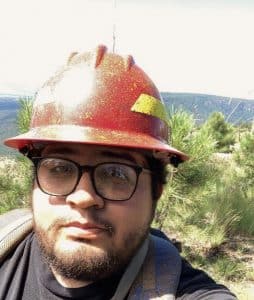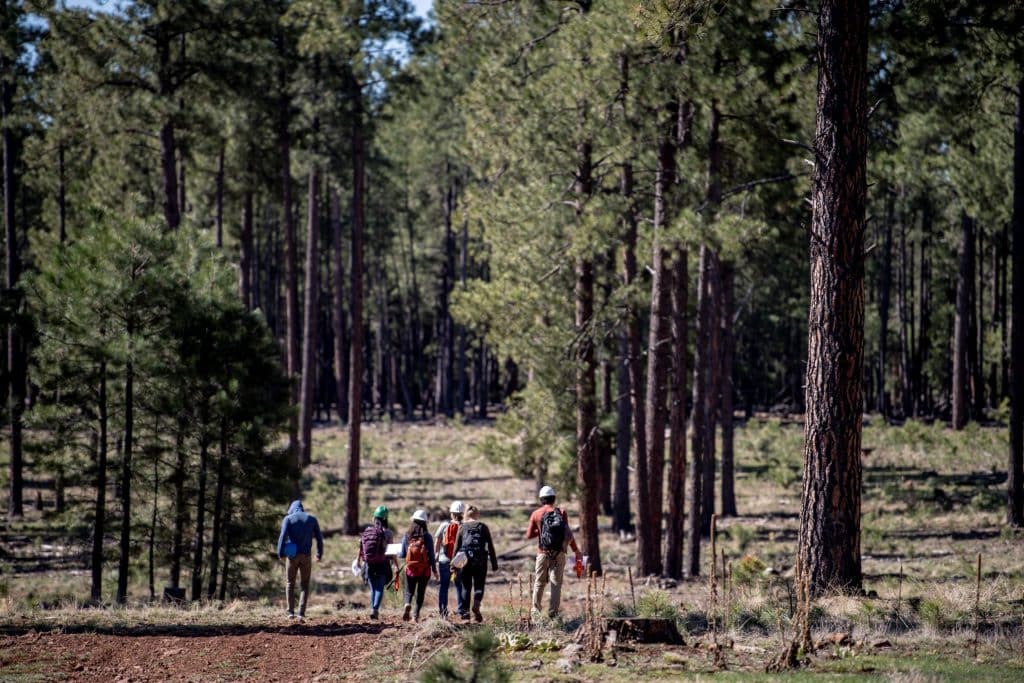Editor’s note: “On November 27, we were profoundly shocked and saddened to learn about the death of Yeon-Su Kim, the executive director and professor in the School of Forestry. Dr. Kim was active in research with numerous publications and secured NAU Flagstaff’s first HSI grant to support the development of the next generation of forestry professionals. An article about her incredible commitment to her college, DEI, and securing this novel grant was being written in consultation with Dr. Kim leading up to the Thanksgiving holiday. She will be truly missed by the NAU community, friends, and family. We publish this story to honor one of our community’s most distinguished members by sharing her drive, tenacity, devotion, and strength.”
Northern Arizona University’s Flagstaff campus recently received its first Hispanic Serving Institute (HSI) grant since being recognized as an HSI university last year. Yeon-Su Kim, the executive director and professor in The School of Forestry, and Anita Antoninka, assistant research professor in The School of Forestry, led the charge to secure an award of more than a quarter million dollars for The School of Forestry for their project titled, “Training the Next Generation of Hispanic Leaders for Managing Resilient Forests,” from the USDA. David Auty, Amanda De La Torre, Kristen Waring and Francisco Villa of NAU-Yuma also contributed to the grant application process.
In addition to training the next generation of Hispanic leaders to manage resilient forests under a changing climate, the grant supports an essential collaboration between two of NAU’s strengths: the study of forest ecosystems and ensuring equitable access to vital research experience for all of its students.
“We accept our students as they are. No one should have to change how they look or speak. We welcome everyone and think no one should hide who they are,” Kim said.
Students will receive a stipend and participate in internships, professional shadowing and training related to culturally responsive forestry management during their time as fellows in the cohort. There’s much to be excited about. A few of their goals for the grant noted in the proposal are to “enhance the cultural responsiveness of the forestry curriculum, experientially train nine undergraduates of the next generation of Hispanic leaders with adaptive capacity for managing resilient forests and include extra-curricular and training activities for all faculty, staff and current students to improve cultural responsiveness of our forestry curriculum.”
Antoninka’s research focuses on soil ecology, specifically “using what we know about soil and ecosystems and the organisms within them to do restoration, especially in dry lands and forest lands,” Antoninka said. A large component of her work focuses on understanding how ecosystems work and how we might be able to fix them when they’re broken. The other significant element of her work is supporting and mentoring students; she works on finding financial support for them, as well as providing internships, mentorships and other training opportunities. Her work focuses on supporting students from historically excluded or minoritized groups.
Kim has been with Northern Arizona University for over twenty years, with numerous publications in her field. Kim is the first female executive director of The School of Forestry position. She has taken to it like a tree to a forest, working on numerous proposals and projects, many with Antoninka.
“As executive director, my goal is for the NAU School of Forestry to be the national leader of inclusive excellence in forest education. I’m very excited about our designation as an HSI,” Kim said. She immediately began attending HSI grant informational sessions and reviewed any grant that would apply to their school’s work. Kim’s team also reached out to receive the benefit of NAU-Yuma’s knowledge and experience as an HSI institute since 2007. When Kim has time, she loves to bake sourdough breads with her own starter. She even challenged herself to look for different bread recipes around the world during the shutdown. The coco bread from Honduras stands out to Kim as the most memorable, but there are plenty more bread-making challenges out there that she’s still excited to try. Like their academic work, Kim notes the trick to bread baking is diligence, patience and giving it time. Though now with her son, the main bread eater, away at college, Antoninka and her family said they will be more than happy to help fill the role.
The initial cohort for the first year comprises Manuel A. Chavez III, Elena Rodriguez, Alyssa Roudebush and Elda Silva. With help from John Schaffer, an instructor at the Institute of Human Development, the group has already created a video to introduce the first cohort of students.

“It feels very inspiring to be part of the first cohort because it allows us to pave the way for others who want to go down this same path. It is also very exciting because it allows us to really explore the forestry field and allow us the opportunity to give out resources about all the opportunities and careers that people can find within Forestry,” Chavez said. “What I hope to get out of the HSI Fellows Program is making many networking opportunities and learning as much as I can to make myself a more efficient forester.”
This grant will build on The School of Forestry’s focus on opportunities for students, allowing them to participate in faculty research projects. The school also helps pair students with companies and organizations for internships. The hope is to double these efforts and focus on broadening access to diverse populations from underserved communities. Diversity, equity and inclusion (DEI) initiatives necessitate representation and faculty dedicated to ensuring the best outcomes. To this end, the faculty members in The School of Forestry meet regularly to discuss DEI topics. A recent topic was ‘culturally responsive teaching,’ One of the most significant takeaways was viewing student differences as a strength instead of a weakness and being open to what these different perspectives could add to the discussion and the field overall. Both Kim and Antoninka felt strongly that national programs like this in forestry will have an immediate benefit to students and the field alike.
Another guiding passion is creating meaningful experiences that provide current students with professional development. Antoninka recently helped the NAU DISCO (Diversity in STEM Cooperative) group support 40 students to attend the National Diversity in STEM conference in Puerto Rico; all students were from historically underserved backgrounds or were first-generation students. Additionally, 16 students gave presentations, and three won awards. She tries to start or cap these trips with a day to independently explore beautiful new environmental landscapes. She also loves to spend time with her family and they do much hiking throughout northern Arizona. Crediting her family for teaching her time management and work-life balance in a way she hadn’t known before, Antoninka said, “I finished my Ph.D. with one child in my belly and one in the audience.” The worlds of work, passion, and family seem inextricably linked. Researching, supporting student research and success, spending time with family and valuing self-care are all admirable qualities for a mentor like Antoninka to possess. The task of training and mentoring the next generation of Hispanic leaders to manage resilient forests couldn’t be in better hands.
Cynthia Gerber | NAU Communications
(928) 523-7341 | Cynthia.Gerber@nau.edu




